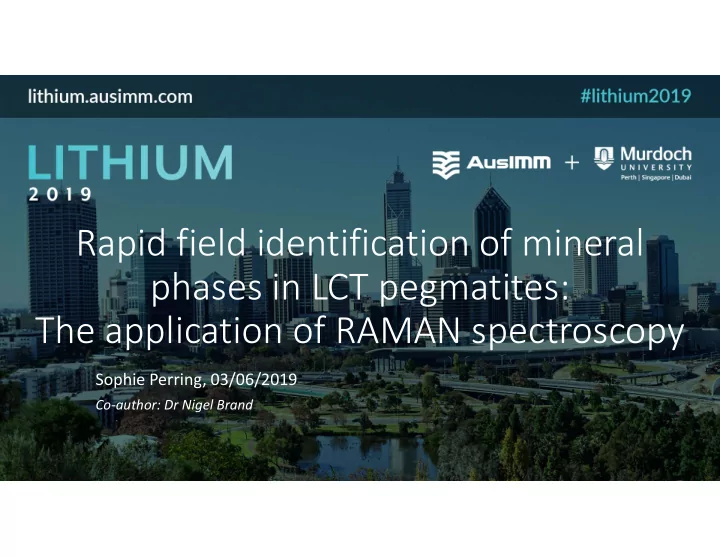

Rapid field identification of mineral phases in LCT pegmatites: The application of RAMAN spectroscopy Sophie Perring, 03/06/2019 Co-author: Dr Nigel Brand
The Problem!
LCT pegmatites • Many minerals are anhydrous – Not SWIR active • Lithium silicates are of economic value – Not detectable by XRF • Raman can readily identify dominant and associated pegmatite minerals: • Quartz, most feldspars, white micas, Li-bearing minerals, pollucite, garnet, topaz, beryl, carbonates, apatite, etc. • Pioneer Resources Sinclair Mine: • 8 000 Drill hole samples • 2 000 Grade control samples • Small case studies
• Monochromatic light from a laser is directed onto a sample What is Raman • Most of the light scatters and remains the same frequency (Rayleigh) • A small percentage of the light shifts frequency as a result of chemical vibration of bonds in a mineral (Raman) • Raman measures this subtle frequency shift: Raman Shift • The vibra�ons are unique to the substance → ‘Fingerprint’ spectrum • Can identify the material
How does it work? • Spectral database of reference material • Custom LCT-pegmatite library of over 300 spectra covering 56 minerals and key mixtures • Non-destructive mineral identification • No sample prep • Mineral samples doesn’t have to be dry • Analysis times vary from 30 seconds to 5 minutes
The Problem!
R am a n In tens ity R am a n In tens ity 50 0 100 0 150 0 2 000 2 500 0 5 00 1 000 1 500 2 000 250 0 300 0 400 400 600 600 800 800 1000 1000 1200 1200 1400 1400 1600 1600 R am a n In tens ity R am a n In tens ity 50 0 100 0 150 0 2 000 50 0 1 000 15 00 2 000 250 0 400 400 600 600 800 800 1000 1000 The Solution 1200 1200 1400 1400 1600 1600 R am a n In tens ity R am a n In tens ity 50 0 1 000 150 0 20 00 25 00 50 0 100 0 150 0 200 0 400 400 600 600 800 800 1000 1000 1200 1200 1400 1400 1600 1600 R a m an Inte ns ity R a m an Inte ns ity 50 0 100 0 1 500 20 00 5 00 1 000 150 0 200 0 250 0 400 400 600 600 800 800 1000 1000 1200 1200 1400 1400 1600 1600 R a m an Inte ns ity R am a n In tens ity 50 0 100 0 150 0 200 0 25 00 0 500 10 00 1 500 200 0 25 00 400 400 600 600 800 800 1000 1000 1200 1200 1400 1400 1600 1600
The Solution 25 00 250 0 300 0 200 0 2 000 200 0 200 0 250 0 2 000 150 0 150 0 1 500 R am a n In tens ity R am a n In tens ity 150 0 R am a n In tens ity R am a n In tens ity R a m an Inte ns ity 1 500 100 0 100 0 10 00 1 000 Beryl Petalite Pollucite Albite, Quartz Eucryptite 1 000 50 0 50 0 500 5 00 5 00 0 0 400 600 800 1000 1200 1400 1600 400 600 800 1000 1200 1400 1600 400 600 800 1000 1200 1400 1600 400 600 800 1000 1200 1400 1600 400 600 800 1000 1200 1400 1600 2 500 250 0 25 00 25 00 20 00 2 000 2 000 200 0 20 00 1 500 150 0 R am a n In tens ity R am a n In tens ity 15 00 R am a n In tens ity R a m an Inte ns ity R a m an Inte ns ity 150 0 150 0 100 0 100 0 1 000 Albite Microcline 100 0 1 000 Amblygonite Spodumene Quartz 50 0 50 0 50 0 50 0 50 0 400 600 800 1000 1200 1400 1600 400 600 800 1000 1200 1400 1600 400 600 800 1000 1200 1400 1600 400 600 800 1000 1200 1400 1600 400 600 800 1000 1200 1400 1600
Mining Applications • Applied to RC Chips, diamond core or hand specimens • Identify the dominant mineralogy • Immediate verification or identification • Geologist logging • Grade control • Identifying mineral zones down a drill hole • Mapping mineral deposits
Bruker BRAVO • Field portable • Class 1M laser product (safe for all conditions of use) • Duo LASER™ (785 and 1064 nm) • Spectral range 300 – 3200 cm -1 • SSE™ (Sequentially Shifted Excitation) • - Fluorescence elimination
Feature Extraction • Specialised spectral feature analysis • Peak position, width and height can provide further mineralogical insight • Improves upon the automated matching of bulk spectra • Aids the delineation of related minerals
Quick Analysis • Mineral identification within minutes • Can differentiate between visually similar minerals e.g. white silicates • Can apply mineral identification to current and future occurrences when logging core
Quick Analysis • Minerals that had previously not been observed or described for the deposit were identified • Previously classed as a Ca-rich plagioclase • Identified as a separate calcium silicate mineral (Prehnite)
Log Drill Holes • Can identify the dominant mineral components • Identify mineral zones down hole • Can be applied to grade control in conjunction with pXRF during ore extraction
Mapping • Provide data for mineral mapping • Gives comprehensive mineral overviews • Can be used to modify alteration maps in preparation for further exploration
• Field portable • Non-destructive • No sample prep required Summary • Rapid mineral identification • Mineral mapping • Discovery
Recommend
More recommend